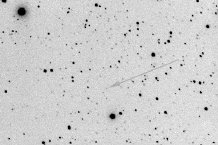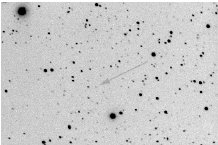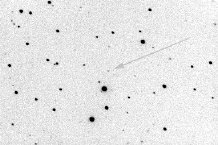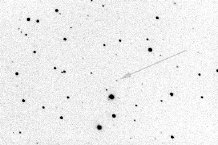 |
The last 2 years a few members of NEKAAL have been actively doing 'follow-up' astrometry on asteroid and comet discoveries through the Minor Planet Center. (Here's an update on asteroid discoveries at Farpoint). Large sky survey groups such as Spacewatch and LINEAR search for objects with the potential of crossing the earth's orbit. NEO's, (Near-Earth Objects), pose a very severe but very rare threat to the entire globe. It is estimated a 1 to 2 kilometer sized asteroid or comet, travelling 30,000 mph or so, would nearly wipe out our civilization. The odds of this happening in anyone's lifetime is probably less than 100,000 : 1. However given the tremendous consequence of just one of the estimated 1/4 million asteroids and smaller number of comets striking the earths' surface, we feel our time spent in verifying and increasing the accuracy of these orbits warranted.
Along with follow-up astrometry on objects others have recently discovered, we at Farpoint are beginning to search for new discoveries of our own. The first astronomical body to be discovered at Farpoint is asteroid 1998 VZ5 (see images above). Since then 1998 YL4 was discovered. From Gary Hug's Farpoint Observatory page you can download either positional data for the next several weeks or elements of each object's orbit and can place them into your planetarium software to plot the objects on your computer. Both these objects are out of range of visual inspection in telescopes but could be imaged with CCD cameras and perhaps faintly with film, although film results would be questionable as neither object is to get any brighter than magnitude 17.3.
One way to increase our chances by a factor of four is to acquire a larger format CCD camera such as an SBIG ST-8. However, funds for this camera are not yet available, and it may be some time before we can raise the necessary $6,500.00. In the mean time if you are "in our neighborhood" and would like to visit with us just let us know. [Home][Who We Are][Contact/Join][Calendar][Observatory] |



